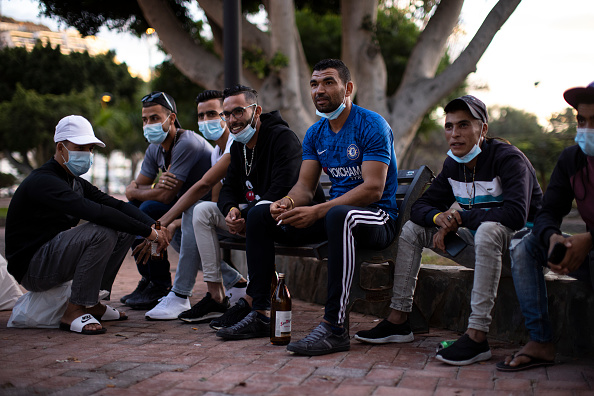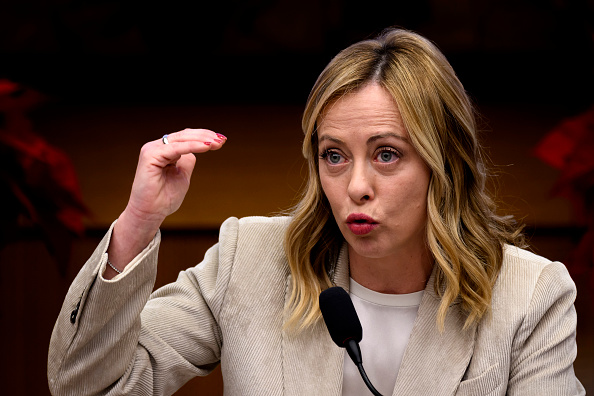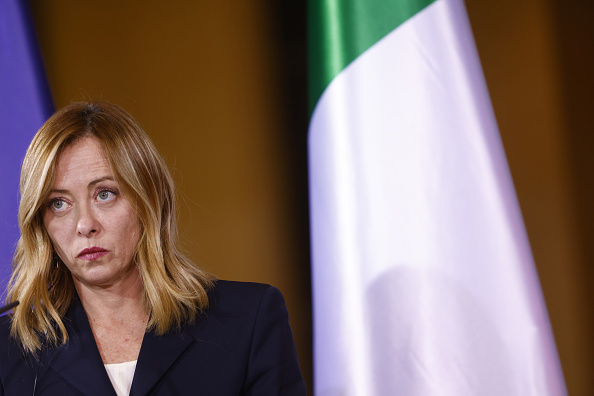For both Italy’s Prime Minister Giorgia Meloni and her “frenemy” coalition partners to the Right, June’s European Parliament election will be largely about migration.
In Meloni’s eyes, her impact on the European Union’s migrant policies shows the success of her growing political ties to European Commission President Ursula von der Leyen.
For the right-leaning Matteo Salvini-led Lega per Salvini Premier (LSP – or simply Lega), the number of irregular migrant arrivals — which rose 50 per cent in 2023 according to the Italian interior ministry — showcases Meloni’s failure.
Numbering 155,750 in total, these migrants were fleeing economic and social turmoil in countries including the Ivory Coast, Guinea and Egypt — the top three nationalities for arrivals — as well as violence in places such as Burkina Faso, which underwent three coup attempts over 2022 and 2023.
These would-be asylum seekers travel along a Tunisia-Italia route, now the most popular for human traffickers based in Africa, the International Organisation for Migration said.
Southern Italy’s island of Lampedusa saw 11,000 asylum seekers arrive in four days in September 2023, four times its domestic population.
Such an increase in arrivals has not gone unnoticed, with statements from Brussels officials indicating that Meloni may be driving a hawkish position on migration at the EU level.
Visiting Lampedusa alongside the Italian leader last September, Commission President Ursula von der Leyen took a pro-border control stance on the rising number of arrivals.
“We will decide who comes to the European Union and under what circumstances. Not the smugglers,” the EC head said.
As part of her efforts to clamp down on migration from the global south, Meloni has worked to tighten European relations with North African states, seemingly in the hopes they will be more willing to help deport illegals from Europe.
VIDEO: Italy surprises with deal to send asylum seekers to Albania.
Read more at https://t.co/2toO52Zsoy pic.twitter.com/yDylSDGiAM
— Brussels Signal (@brusselssignal) November 8, 2023
In November, the Prime Minister signed a five-year agreement with Albania’s premier Edi Rama.
Under that deal, Italy will send up to 3,000 asylum seekers at a time to the country where their claims are to be processed.
Italy says it will welcome successful asylum seekers who are granted international protection — and organise their deportation from Albania if they are not.
The arrangement will see Italy set up and run two processing centres in the Balkan nation to facilitate the agreement, at a cost to Rome of €600 million over five years. The deal has since been approved by the Albanian parliament.
The second deal, which Meloni announced on January 29, is the so-called “Mattei plan”.
This scheme involves Italy making €5.5 billion available to African countries to boost the continent’s growth, particularly within the energy sector.
The EU would then benefit both from a bolstered energy source and diminished migration, it is argued.
Diplomatically, the deal is an attempt to “position Italy as a key interlocutor for African countries with the EU” at a time when France is losing influence, Oxford Analytica explained.
Yet the funding “is a fraction of the hundreds of billions of euros needed to accomplish its stated goals, Oxford Analytica argued, with the project appearing to be geared more towards a domestic audience than African needs”.
Meloni also joined von der Leyen in Tunis in July 2023, where the EC President signed an agreement with President Kaïs Saïed.
The deal will see the EU provide €150 million to a Tunisian Government teetering on the brink of bankruptcy and €105 million to help it buy boats, jeeps, radar and drones to combat human smugglers based in the country.
Senior MEPs have since claimed that this deal has put €150 million directly into the hands of Saïed.
Still, Von der Leyen and Rome are both encouraging the African leader to conclude a $1.9 billion IMF bailout agreed at a staff level in October 2022.
Such a suggestion has not gone down well in Tunisia. According to the International Crisis Group (ICG), Saïed and his supporters “reject the economic reforms attached to the loan” and might choose to default on Tunisia’s debts instead.
One European diplomat has said that the bloc would retaliate if Tunisia rejects the bailout, explaining that Brussels has adopted a so-called “more or less policy” to deal with the crisis.
“The fewer EU-promoted reforms Tunis makes, the more money will flow from Brussels,” the ICG said, explaining Brussels approach.
For Italian voters — especially those on the centre-right — June’s elections offer a choice. On the one hand, Meloni and her foreign minister — Forza Italia party leader Antonio Tajani — have presented an approach of working to validate Italy’s image as a responsible EU partner for addressing migration as a bloc.
The other, according to University of Bologna political scientist Paolo Pombeni, is the approach of Matteo Salvini’s Lega party.
For this group, Italy should stop trying to play nice with Brussels and instead adopt a Eurosceptic approach to mass migration.
Together with France’s Marine Le Pen — with whom the Lega leader appeared in September — Lega believes Italy should take a “distant, deaf and arrogant” approach to the issue, which they have described as an “organised migratory wave”.
EU Member States have chosen to tighten their borders with Italy after the arrival of thousands of migrants on the Mediterranean island of Lampedusa. https://t.co/Jhfzi33Kek
— Brussels Signal (@brusselssignal) September 15, 2023





